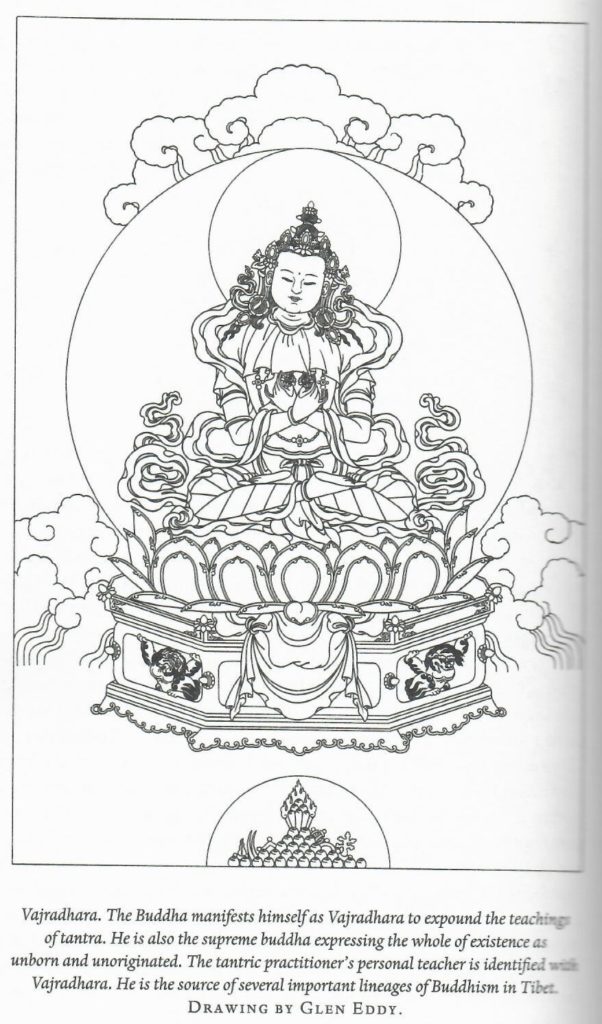Devotion
Surrendering

Volume Three
***
At first, devotion is inspired by a sense of inadequacy. We begin to realize that we are not up to coping with life or that we are confused about it. Even the little lighthouses we might have in the midst of our darkness seem quite vulnerable. So devotion in the hinayana stage comes from a sense of poverty. We take refuge in the buddha, dharma, and sangha because we feel trapped in the problems of life. We have failed to make a comfortable nest. We want to change our claustrophobic and painful world.
You might say that certain people approach the path from more positive inspirations. They might have had a dream or a vision or an insight that inspired them to search more deeply. Possibly they had money to fly to India or the charm and courage to hitchhike there. Then they had all sorts of exotic and exciting experiences. Someone stuck in New York City might consider it a rich and heroic journey. But fundamentally such people still have the mentality of poverty. Although their initial inspiration may have been expansive, still they are uncertain about how to relate to the teachings. They feel that the teachings are too precious, too rich for them to digest. They doubt whether devotion grows as well. You are more willing to give something to your guru.

But what do you want in return? That is the problem. “I want to be saved from pain, my misery, my problems. I would like to be saved so that I might be happy. I want to feel glorious, fantastic, good, creative. I want to be like my guru. I want to incorporate his admirable qualities into to my personality. I want to enrich my ego. I want to get some new reformation into my system so that I might handle myself better.” But this is like asking for a transplant of some kind. “Maybe the Heart of me Great Wisdom could be transplanted into my chest. Perhaps I could exchange my brain.” Before we wholeheartedly give ourselves to serving a guru we should be very suspicious of why we are doing it. What are you looking for, really?
You may approach a spiritual friend and declare your intention to surrender to him. “I am dedicated to your cause, which I love very much. I love you and your teachings. Where do I sign my name? Is there sign dotted line that I could sign on?” But the spiritual friend has none—no sotted line. You feel uncomfortable. “If it is an organization, why don’t they have a place for me to sign my name, some way to acknowledge mat I have joined them? They have discipline, morality, a philosophy but no place for me to sign my name.” “As far as this organization is concened, we do not care what your name is. Your commitment is more important than putting down your name.” You might feel disturbed that you will not get some form of credentials. “Sorry, we don’t need your same or address or telephone number. Just come and practice.”
This is the starting point of devotion—trusting a situation in which you do not have an ID card, in which there is no room for credits or acknowledgment. Just give in. Why do we have to know who gave in? The giver needs no name, no credentials. Everybody jumps into a gigantic cauldron. It does not matter how or when you jump into it, but sooner or later you must. The water is boiling, the fire is kept going. You become part of a huge stew. The starting point of devotion is to dismantle your credentials. You need discoloring, depersonalizing of your individuality. The purpose of surrender is to make everyone gray—no white, or blue—pure gray. The teaching demands that everyone be thrown into the big cauldron of soup. You cannot stick your neck out and say, I’m an onion, therefore I should be more smelly.” “Get down, you’re just another vegetable.” “I’m a carrot, isn’t my orange color noticeable?
“No, you are still orange only because we haven’t boiled you long enough.”
At this point you might say to yourself, “He’s warning me to be very suspicious of how I approach the spiritual path, but what about questioning him? How do I know that what he is saying is true?” You don’t. There is no insurance policy. In fact, there is much reason to be highly suspicious of me. You never met Buddha. You have only read books that others have written about what he said. Assuming that Buddha knew what was true, which of course is itself open to question, we do not know whether his message was transmitted correctly and completely from generation to generation. Perhaps someone misunderstood and twisted it. And the message we receive is subtly but fundamentally wrong. How do we know that what we are hearing is actually trustworthy? Perhaps we are wasting our time or being misled. Perhaps we are involved in a fraud. There is no answer to such doubts, no authority that can be trusted. Ultimately, we can trust only in our own basic intelligence.
Since you are at least considering the possibility of trusting what I am saying, I will go on to suggest certain guidelines for determining whether your relationship with a teacher is genuine. Your first impulse might be to look for a one hundred percent enlightened being, someone who is recognized by the authorities, who is famous, who seems to have helped people we know. The trouble with that approach is that it is very difficult to understand what qualities an enlightened being would have. We have preconceptions as to what they are, but do they correspond to reality? Selecting a spiritual friend should be based upon our personal experience of communication with this person, rather than upon whether or not the person fits our preconceptions. Proper transmission requires intimate friendship, direct contact with the spiritual friend. If we see the guru as someone who possesses higher, superior knowledge, who is greater than us, who is extremely compassionate to actually pay attention to us, then transmission is blocked. If we feel that we are a miserable little person who is being given a golden cup, then we are overwhelmed by the gift, we do not know what to do with it. Our gift becomes a burden because our relationship is awkward and heavy.
In the case of genuine friendship between teacher and student there is direct and total communication which is called “the meeting of the two minds.” The teacher opens and you open; both of you are in the same space. In order for you to make friends with a teacher in a complete sense, he has to know what you are and how you are. Revealing that is surrendering. If your movements are clumsy or if your hands are dirty when you shake hands, you should not be ashamed of it. Just present yourself as you are. Surrendering is presenting a complete psychological portrait of yourself to your friend, including all your negative, neurotic traits. The point of meeting with the teacher is not to impress him so that he will give you something, but the point is just to present what you are. It is similar to a physician-patient relationship. You must tell your doctor what is wrong with you, what symptoms you have. If you tell him all your symptoms, then he can help you as much as possible. Whereas if you try to hide your illness, try to impress him with how healthy you are, how little attention you need, then naturally you are not going to receive much help. So to begin with devotion means to be what you are, to share yourself with a spiritual friend.